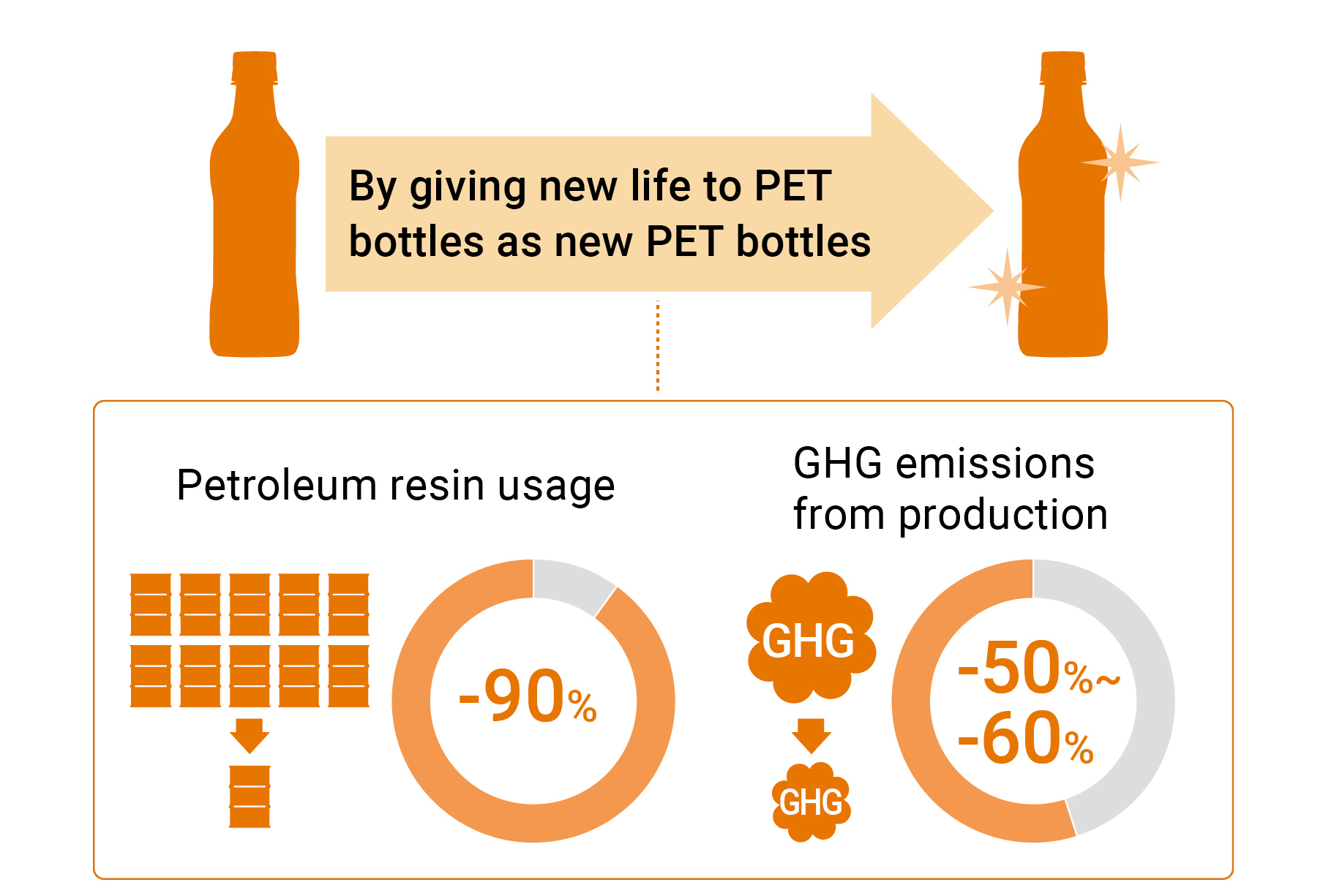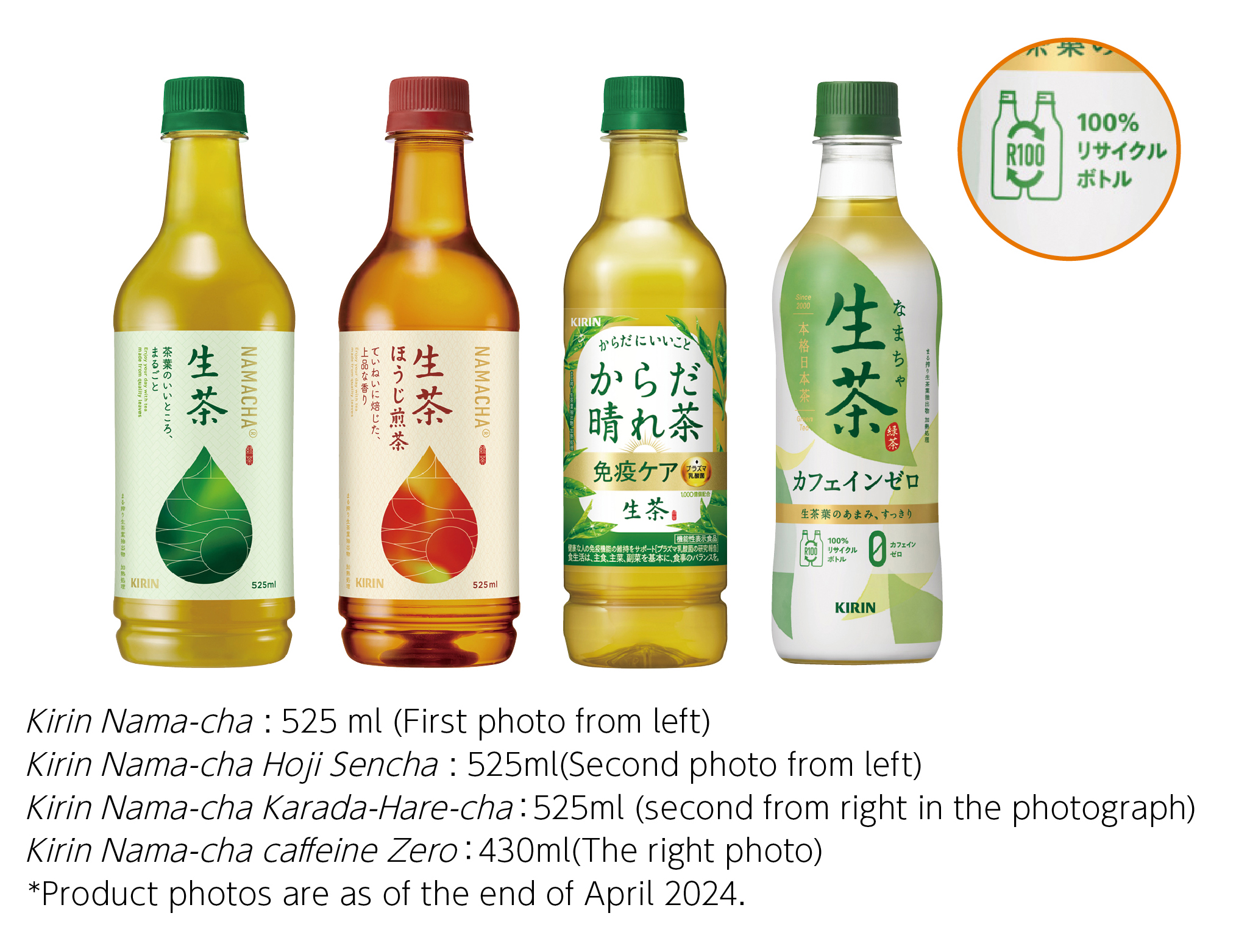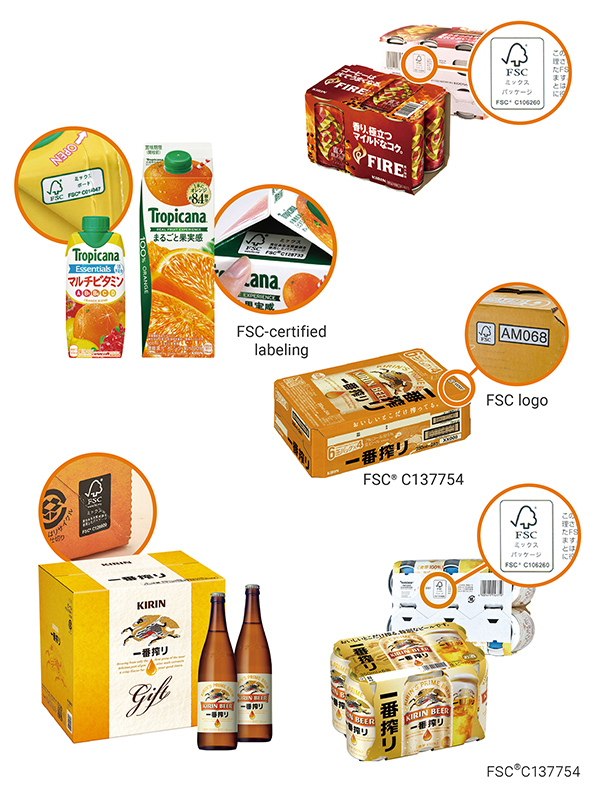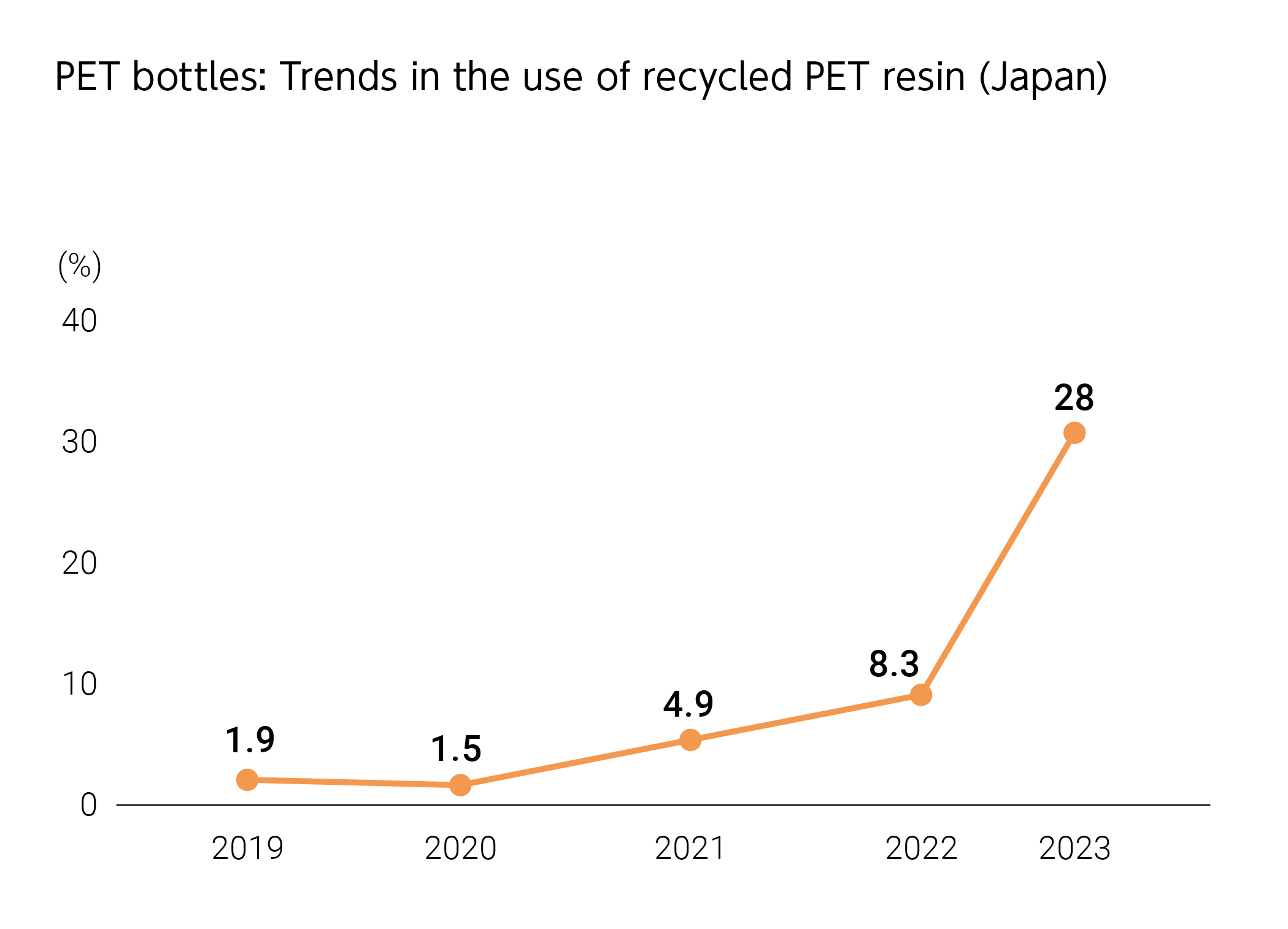Containers and Packaging
Circulates containers and packaging in a sustainable way
Containers and packaging are essential to maintain the quality of products when delivering them to customers. Greenhouse gas (GHG) emissions, however, are currently unavoidable in the manufacturing and transportation of containers and packaging. In addition, the excessive extraction of raw materials for containers and packaging and the improper disposal of used containers and packaging can damage natural capital. To address these various issues related to containers and packaging, the Kirin Group has promoted 3Rs (Reduce, Reuse, Recycle), and has aimed to make containers and packaging lighter, utilize recycled containers, and achieve a high recycling rate. With regard to paper containers and packaging, we have been promoting sustainable paper use in order to solve problems related to human rights in raw material production areas and the destruction of forests. In 2020, we achieved 100% use of FSC-certified paper for all paper containers at Kirin Brewery, Kirin Beverage, and Mercian, which we have subsequently maintained. We plan to expand this initiative to other Kirin Group companies around the world. In response to the problems associated with plastics, we aim to create a “society that continuously circulates plastics”.
Main Activities
- Developed the "Kirin Group Plastic Policy" in 2019, and set a target to replace 50% of PET resin used in Japan with recycled PET resin by 2027
- Expanded the product line of “R100 PET bottles” made from 100% recycled PET resin
- Began selling no label products in 2021 in order to reduce plastic usage.
- Begun technical studies on recycling PET resin using “chemical recycling” in a joint project with several companies with the aim of creating a "society that continuously circulates PET bottles"
- Strengthened collaboration with other companies and local governments as a part of efforts to collect PET bottles
- Maintained our achievement of the 100% use of FSC-certified paper for all paper containers and packaging in Kirin Brewery, Kirin Beverage, Mercian
- Set targets to use 100% sustainable paper resources at Lion (Australia and New Zealand) by 2025
- Developed technology for decomposing PET and refining the monomers produced after decomposition in relation to chemical recycling of PET bottles in 2023
- Started using chemically recycled resin in PET bottles for alcoholic beverages for the first time in Japan in 2023
- Joined the Business Coalition for a Global Plastics Treaty (Japan) in order to establish an international treaty aimed at eliminating plastic pollution, in November 2023
Targets
Percentage of recycled PET resin used at operating companies in Japan
100% by 2050 (Environmental Vision 2050)
50% by 2027 (Plastic Policy)
38% by 2024 (non-financial target)
Progress
Recycled resin ratio
Weight reduction ratio
FSC-certified paper ratio
Material mix of containers and packaging, by weight
Sustainable PET bottles
R100 PET bottles
In accordance with the Plastic Policy that we established in 2019, the Kirin Group is gradually expanding the use of “R100 PET bottles” made from 100% recycled PET resin.
R100 PET bottles use mechanically recycled resin. By using this resin, we can reduce petroleum-based resin by 90% and GHG emissions by 50-60%, compared with conventional PET resin. We began using recycled resin for some of the packaging of Kirin Gogo-no-Kocha Oishii Muto (sugar-free) in February 2014.
Subsequently, in 2019, we began using “R100 PET bottles,” which use 100% recycled PET resin, for Kirin Nama-cha Decaf.
Our use of “R100 PET bottles” as of April 2024 is shown below.
*Product photos are as of the end of April 2024.
Chemical recycling
In December 2020, Kirin began technical studies aimed at commercialization focusing on recycling PET bottles using chemical recycling.
In the current mechanical recycling system, there are constituents that are difficult to remove from resins, and it is understood that the quality of resins deteriorates with repeated recycling.In chemical recycling, we sort, pulverize and wash used PET bottles. After the processes, we depolymerize them (chemical decomposition treatment), and break down and refine the PET into intermediate materials, and polymerize again into PET. It is possible to recycle used PET bottles into new materials as many times as we want by decomposing them down to molecular size. We can also recycle PET products other than used PET bottles into PET bottles with this technology.
In December 2023, we developed two technologies, an alkaline decomposition method and a method of refinement by electrodialysis. We developed the alkaline decomposition method at Kirin Central Research Institute and the method of refinement by electrodialysis in joint research with the Faculty of Science andEngineering, Waseda University. This refining method regenerates alkaline components during the refining process, which can then be reused in the decomposition process. Therefore, by combining these two technologies, we can realize a resource-circulating recycling process. With these technologies, we can carry out the processes for decomposing and recycling PET in a short time and with low energy, reducing environmental impacts and costs. These two PET chemical recycling technologies that we have developed are currently under patent filing. The Kirin Group is seeking partners to develop practical applications for these technologies, and we are working to achieve our vision for containers and packaging and create a society that continuously circulates resources, taking the environment into consideration.
In 2023, Kirin Brewery introduced chemically recycled resin for 3L PET bottles as containers for Tap Marchè and TAPPY, that are beer serving systems, at bars and restaurants. This was the first attempt to introduce chemically recycled resin for PET bottles for alcoholic beverages in Japan.
In this way, we are aiming to establish a circular economy for PET resin products.
Promotion of more efficient plastic sorting and collection
Aiming to create “a society that continuously circulates plastics,” in June 2022, we launched a commercial-scale trial with WELCIA YAKKYOKU CO.,LTD., and as of March 2024, this trial has moved to regular operation. Used PET bottles are collected and sorted using collection boxes installed in WELCIA’s dragstores, and once collected at WELCIA's distribution center, they are delivered to recycler Far Eastern Ishizuka Green PET Corporation.
Sustainable paper containers
At the end of November 2020, the Kirin Group achieved the 100% use of FSC-certified paper in all paper containers and packaging at Kirin Brewery, Kirin Beverage, and Mercian. This initiative covers all paper containers, including “6-can packs,” “gift boxes,” “paper containers,” and “cardboard cartons for products,” and it is the first declaration and achievement of such a target by a Japanese manufacturer. In 2022, we revised the “Action Plan for the Sustainable Use of Biological Resources,” and expand companies complying the action plan to Kyowa Kirin, Kyowa Hakko Bio, Lion, Koiwai Dairy Products. We began related initiatives in these companies.
*Product photos are as of the end of April 2024 or at the time of the event.
Reduce
Corner-cut cartons
The Institute for Packaging Innovation developed “corner-cut cartons,” and we introduced them to the market in 2004. The beveled corners mean that the carton has eight sides, which makes the carton stronger, and the cardboard thickness has been reduced. This results in a 10.9% reduction in the weight of the carton compared to conventional cartons.
Smart-cut cartons
The smart-cut carton is based on the corner-cut carton technology. In addition to the reduction in weight, the corners of the long edges at the top of the carton have been cut to fit the space created by the lids of the 204-diameter can.
This has resulted in a 16% weight reduction compared to the previous corner-cut carton. The Institute for Packaging Innovation developed the smart-cut carton in conjunction with a container and packaging manufacturer, and obtained a joint design registration.
6-can pack
In addition to being easy to hold and remove, 6-can pack containers of beer are designed to be lightweight. For example, we have installed a cut-out section at the sides of the pack to fit the can edge (Kirin patent), and use a “can bottom lock structure” to stabilize the bottoms of the can with paper. These innovations have resulted in a reduction in packaging materials of 4 grams, or 8%, per 500 ml 6-can pack. At the same time, they have also improved the pack’s can-holding power.
Reducing the weight of paper containers for wine
Since March 2022, Mercian has reduced the weight of containers for its wine. Specifically, this innovation was applied to five types of wine, namely FRANZIA (red, white, dark red) bag-in-box and FRONTERA (Cabernet Sauvignon and Chardonnay) wine-fresh servers.
For these products, Mercian uses bag-in-box containers, consist of outer paper boxes and inner flexible plastic bags. By reducing the weight of the outer box from 190g to 143g, by approximately 25%, we reduce the use of paper resources by around 31 tons per year.
*Product photos are as of the end of April 2024 or at the time of the event.
Reducing the weight of PET bottles for wine
In 2022, the Institute for Packaging Innovation developed a 720ml PET bottle for wine that is the lightest in Mercian’s history. We reduced the weight by 5g, from 34g to 29g. Mercian expects that the use of this lightweight PET bottle for all 720ml PET bottle products that it produces and sells to reduce PET resin use by approximately 83 tonnes per year and GHG emissions by approximately 286 tonnes. The lightweight PET bottle received the “46th Kinoshita Award for Packaging Technology.” The bottle won the award partly because we reduced resin use by approximately 15% while maintaining the “Bordeaux shoulder shape” and a “clean body shape,” and partly because the fact that it uses the Kirin Group's gas barrier coating technology, which uses DLC*1 film, to keep wine fresh for a long period of time.
* Abbreviation for Diamond-Like Carbon (Patent No. 4050648, etc.), a technology that forms a thin film of carbon on the inside of PET bottles to inhibit the permeation of oxygen, water vapor, carbon dioxide and other gases.
Use of roll labels
Since September 2020, Kirin Beverage has used “roll labels” on some PET bottle products for sale in vending machines. There are two main types of labels for PET bottled soft drinks: shrink labels and roll labels. We place shrink labels over bottles in the filling plant, then apply heat to shrink the label. This means a certain thickness of labels is required. On the other hand, we attach roll labels by wrapping them around the PET bottle, which enables us to make the label thinner. Customers can easily remove the label, contributing to sorting trash and recycling. At Kirin Beverage, we use roll labels for some products sold exclusively in vending machines, such as Kirin Namacha, Kirin Gogo-no-Kocha Oishii Muto, Kirin Loves Sports, Kirin Amino Supplement C, and Kirin Tennensui Natural Mineral Water.
Since February 2023, additional roll labelers have been installed at Kirin Beverage Shonan Plant and Shiga Plant to expand application of roll labels on the company’s brands.
Lightest PET bottles for water produced in Japan
The Institute for Packaging Innovation has developed and put into practical use the lightest 2L PET bottle for water produced in Japan, at 28.3g. We reduced the weight of the 2L PET bottle from 63g prior to June 2003 to 28.9g in 2015. We further reduced the weight in April 2019 by improving the bottle’s screw top, including making the screw threads narrower and the screw portion shorter, thereby putting it into practical use as the lightest such PET bottle produced in Japan. These efforts will result in annual reductions of PET resin use of approximately 107 tonnes and GHG emissions of approximately 375 tonnes. In addition, for some 2L and 1.5L large PET bottle products, such as Kirin Gogo-no-Kocha and Kirin Nama-cha, we reduced the weight by approximately 16%, from 38.2g to 32.2g, by improving the molds of preforms. We have been gradually introducing these bottles since December 2020. These efforts will result in annual reductions of PET resin use of approximately 439 tonnes and GHG emissions of approximately 1,515 tonnes.
No label product
Since March 2021, we have been selling Kirin Nama-cha No Label 6-Pack and Kirin Nama-cha Hoji Sencha No Label 6-Pack at merchandise stores in Japan. We have also been selling Kirin Nama-cha No Label and Kirin Nama-cha Hoji Sencha No Label exclusively online. In May 2022, we expanded our range of no label products with the launch of Kirin Gogo-no-Kocha Oishii Muto (sugar-free) No Label and Kirin FIRE ONE DAY Black No Label exclusively online. In April 2023, we began sales of a new product, Kirin Shizen-ga-Migaita Natural Water No Label, exclusively online. In June 2022, we began test sales of Kirin Nama-cha No Label with Paper Sticker at some mass merchandise stores in the Tokyo metropolitan area. By attaching small paper stickers that provide required information, we can sell individual products without conventional labels. In August 2023, we announced PET bottle direct printing technology compatible with recycling processes.
Shortening of labels and packaging materials
We have shortened the width of labels on bottles for the 600ml Kirin Nama-cha and Kirin Nama-cha Hoji Sencha that we released in 2022. By reducing the size of the labels and making it thinner by switching to roll labels, we reduced resin use by approximately 180 tonnes and GHG emissions of approximately 400 tonnes. We have made the paper packaging materials for the 525ml and 600ml products in the six-bottle packs of no label products shorter than those of the products we launched in 2021, reducing paper consumption. We also use FSC-certified paper for packaging materials and display a label of the certification.
*Product photos are as of the end of April 2024 or at the time of the event.
Reducing the weight of aluminum cans
In 2011, we achieved a weight reduction of our aluminum cans approximately 29% with our 204 diameter can compared with the 209 diameter can which was standard at the time, by reducing the diameter of can lids, narrowing the top and bottom edges, thinning the walls. Working with materials manufacturers, we developed an aluminum can with thinner can lids and a body in 2016. We have reduced the overall weight of the can by approximately 5% (from 14.6g to 13.8g). This represents a weight reduction of 33% (6.7ɡ) from the 209 diameter can. Weight reduction is necessary for both steel and aluminum cans. In particular, aluminum requires a large amount of electricity for smelting, so weight reduction contributes significantly to the reduction of Scope 3 GHG emissions.
Lightest returnable glass bottles in Japan
Our returnable glass bottles for beer are the lightest among those produced in Japan in all sizes (633mL, 500mL, and 334mL). As well as being light in weight, returnable glass bottles need to be durable enough to maintain their returnable functionality and strong enough to ensure consumer safety and security of mind. To solve this dilemma, the Institute for Packaging Innovation created the lightest returnable glass bottles by making excellent use of innovations such as a ceramic coating that forms a thin film on the bottle’s outside surface, an impact-resistant shape design, and a bottle mouth design that satisfies the conflicting requirements of being easy to open and able to be sealed tightly and that is also strong enough not to chip when opened.
Reuse
Reuse of glass bottles
In Japan, people have collected and reused glass bottles over and over since the Meiji Era (more than a hundred years ago). Returnable glass bottles come back to plants and are washed thoroughly inside and outside to make them as clean as a new bottle. After stringently checking the bottles for scratches and cracks with an empty bottle inspection machine, we put the bottles back into production lines and fill them with beer. When handled carefully, returnable glass bottles last for an average of about eight years. This means they are used around 24 times.
Recycle
Recycling of PET bottles
The Kirin Group promotes recycling of PET bottles as a member of the Council for PET Bottle Recycling in Japan. Under the council’s Fourth Voluntary Action Plan (FY2021-FY2025), members of the council are working toward a target recycling rate of at least 85% (base year: FY2004). In 2022, the recycling rate was 86.9%, achieving the target.In October 2022, Kirin Beverage introduced new recycling boxes, specially designed by soft drink industry to prevent other objects than PET bottles, next to vending machines, in order to reduce contamination by foreign substances. We had installed 1,000 boxes by the end of 2022. We will continue cooperating with the industry to promote bottle-to-bottle recycling activities.
Recycling of glass bottles
We turn old returnable glass beer bottles and one-way glass bottles into cullet, for use primarily as the raw material for making new glass bottles. In particular, we are pursuing uses for cullet made from colored glass, which cannot easily be reused for glass bottles. We are expanding potential ways to recycle this material for other applications, including building materials and road paving materials.
Recycling of aluminum cans
The Kirin Group is pursuing the use of aluminum cans that use a high rate of recycled metal. We have also joined the Japan Aluminum Can Recycling Association, and we provide assistance for the collection of used aluminum cans. Through such measures, we are promoting the recycling of empty cans. Can manufacturers recycle aluminum cans discarded at breweries and reuse 100% of them as aluminum cans for beer.
Promotion of recycling in Australia and New Zealand
Lion has established the “Sustainable Packaging Strategy” to promote recycling. In order to promote this strategy, the company has established Lion's Sustainable Packaging Project Steering Group, and has set the following goals. Lion is also promoting activities to achieve these targets, which are aligned with those of the Australian Packaging Covenant Organisation (APCO).
- Increasing recycled content to at least 50% by 2025.
- 100% of Lions packaging material to be reusable, recyclable, or compostable by 2025
- A commitment to zero avoidable waste to landfill by 2025
- Promoting activities to achieve these targets, which are aligned with those of the Australian Packaging Covenant Organisation (APCO).
As glass accounts for the highest proportion of Lion's material inputs, Lion is working closely with its supplier to increase the recycled content of glass bottles.
Australia has container deposit schemes in seven of its eight states and territories, with Tasmania to commence a scheme in 2024.
Lion plays an important role in Australia’s Container Deposit Schemes, and is involved in the management or coordination of every scheme in operation.
Our involvement dates back nearly fifty years in South Australia, where Lion holds a majority of shares in Marine Stores Pty Ltd, a collection coordinator that aggregates collected materials for reuse and recycling across South Australia and Northern Territory.
In Queensland and Western Australia, Lion participates in the administration and operation of Container Deposit Schemes as a member of the not-for-profit Container Exchange (QLD) Limited and WA Return Recycle Renew Limited (WARRRL) entities, which were established and appointed as Producer Responsibility Organisations to coordinate those schemes.
In New South Wales and Australian Capital Territory, Lion participates in Exchange for Change (EfC), a joint venture that coordinates the two schemes.
In Victoria, Lion participates as a member of not-for-profit entity VicReturn Limited, the coordinator of the Victorian scheme, which commenced in November 2023.
Lion is also a member of the not-for-profit entity TasRecycle Limited, which is bidding to be coordinator of the Tasmanian scheme expected to commence in 2024.
The majority of Container Deposit Schemes in Australia are experiencing strong growth in returns of containers, particularly those that have only been implemented in recent years. State governments of the older schemes, such as South Australia (the best performing scheme in Australia) and Northern Territory, are currently looking at legislative changes to modernize their schemes and further increase rates of return, including increased automation and technology, streamlining of scheme governance and management, and broadening the scope of containers subject to the scheme.Lion is working closely with all scheme entities and relevant governments to look at additional initiatives and policy development to further drive growth in return, particularly in sectors such as commercial (such as hospitality) and industrial, public place, and high rise buildings.


























